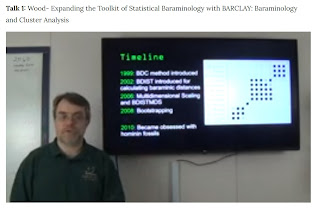Origins2020 recap
The weirdness of 2020 continued last week with our first Origins conference conducted entirely online. It was my first time in 20 years that I didn't travel somewhere and meet up with people for this conference, but this was a pretty decent facsimile all things considered. I need to pause here and give a gigantic thank you to CBS president Matt McLain and his army of students who pulled this thing off in basically a month. We were scrambling to get everything edited and recruit speakers, and frankly, it turned out well. It was far and away the biggest attendance we've ever had at an Origins conference! I was very encouraged by the whole thing, even though I missed the personal time hanging out and talking about anything and everything.
The format was pretty simple. There was a regular schedule of pre-recorded lectures that was punctuated by meetings and Q&A sessions conducted on Zoom. So we'd meet in the morning on Zoom (usually about 40-50% of the registrants), and then watch the scheduled lectures, and then Zoom for Q&A.
As far as the talks are concerned, a big highlight for me was the parasitology research from Jeremy Blaschke's research group. He and his students are looking at the occurrence and ultimately origin of the parasitic lifestyle in all animals we know about. They found an overwhelming majority of parasitic lineages had very few species, implying a relatively recent origin. We get overwhelmed by parasites when we think about complex life cycles or, well, tapeworms. Tapeworms are gross, and I have trouble imagining what good a tapeworm could be. Jeremy's work indicates that the tapeworms are actually a special case of parasite. They're still difficult to explain, but most parasites may not be so difficult.
I also enjoyed the baraminology day, where I introduced the new software BARCLAY. This new program replaces BDISTMDS and expands the toolkit with additional options for distances, correlation coefficients, and cluster analysis. I also enjoyed learning about pareiasaurs and the baraminology of bunnies (again).
Paul Garner's presentation on hard problems in geology won accolades for his personal testimony about how the formation of granite both challenged him and rewarded his patience. It was a very encouraging presentation.
On the geology day, Steve Austin took us on a historical tour of theories of Grand Canyon formation, focusing on his own favorite, spillover. He was joined by friends and collaborators that probably would not have joined him in person. The Q&A was pretty lively after that.
If you're interested in seeing the talks, we're working on a way to allow you to pay the registration fee, which will give you access. I'm hoping to get permission to post my plenary talk tomorrow. We'll see what happens. Meanwhile, the conference abstracts are available to download for free:
But wait - there's more! I'll be running more stories all week with other announcements. Check back for those.
Have you read my book? You should check that out too!

